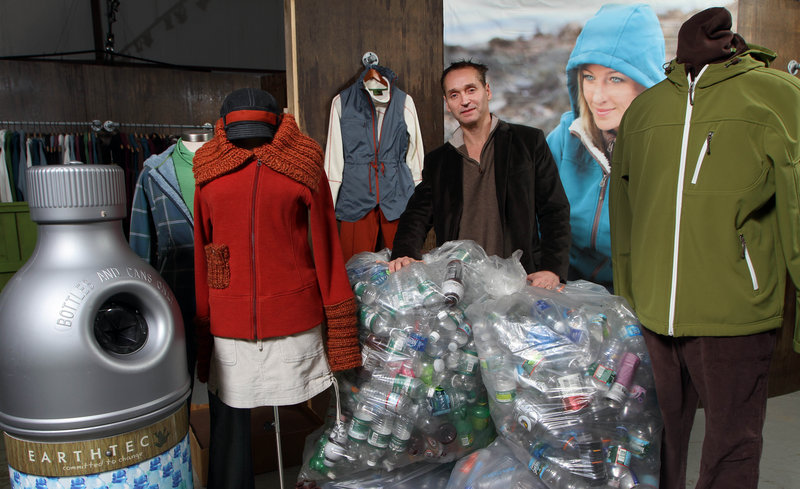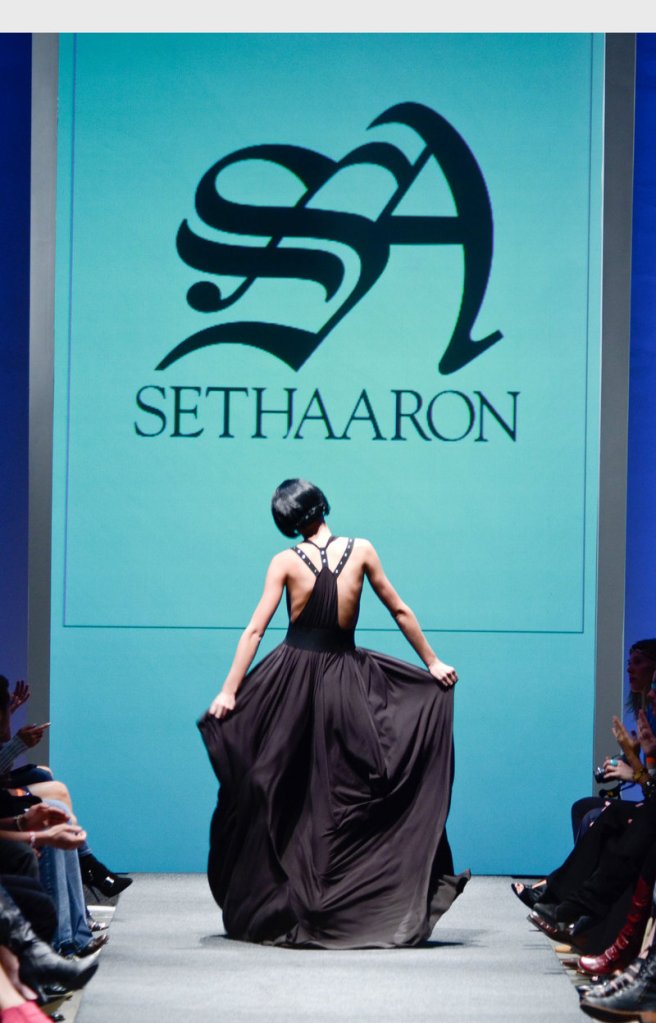PORTSMOUTH, N.H. – The Earthtec models on the runway at Portland Fashion Week in Oregon this week were dressed much like those who walked for other designers, in chic and sexy styles made from high-quality fabric.
But their clothing started out unlike any others: as plastic bottles.
Now the creator of Portsmouth-based Earthtec, Dennis Randall, is reaping the dividends of the work that’s gone into a company that started 15 years ago in a basement with $600 and two sewing machines.
The city of Portland is wooing Earthtec to build a manufacturing plant in Oregon, which passed the nation’s first bottle recycling bill. National Geographic has contracted the company to produce a line of apparel, a spokeswoman for the organization confirmed. And Randall is partnering with Portland-area designer and “Project Runway” winner Seth Aaron Henderson for a sustainable clothing line that will be sold by a yet-unnamed national retail chain.
The latter deal, Randall said, will expose more consumers to apparel that is not only fashionable and good for the planet, but affordable.
“Nine out 10 people still don’t know you can take a water bottle and make clothing out it,” said Randall. “We’re giving this product a second life. Otherwise it’ll end up in a landfill for a couple of thousand years.”
Randall, 45, a Minnesota native who summered in New Hampshire with his grandparents as boy, is passionate about fashion design, the outdoors and ecology. He has worked for years to create fashionable clothing from organic and recycled materials but struggled to be able to price it for mass consumption and to have maximum impact on the environment.
Randall started his clothing line in 1991 in York, Maine. He was making high-quality women’s wear from organic fibers. At the time, recycling plastic bottles into fabric was “an imperfect science,” he said.
“It was a nightmare in the knitting process and there were a lot of contaminants,” Randall said.
The plastic water bottles are shredded to fine flakes and contaminants are removed, Randall said. The flakes are heated, then rapidly cooled and put through a spinner that pushes out fine fibers, which are then woven into fabric.
He began selling the clothes out of a closet-sized kiosk and the line’s popularity grew. Soon he was producing a line of silk and linen pants for the upscale catalog company Garnet Hill.
In 2002, he decided to move most of his manufacturing to China to be able to price his product competitively.
His decision was “regrettable, but understandable,” said Sarah Brown, executive director of Green Alliance, which promotes a network of 95 green-minded businesses in New Hampshire, Maine and Massachusetts.
“I would rather have him play with the big boys and get the message out about this recycled clothing than have those jackets be so pricey no one can touch them,” Brown said. “He’s making his green line available to everybody.”
And now, he says, retailers are “starting to get it.”
At the Earthtec store Randall opened this month in downtown Portsmouth, the highest-priced item was a winter coat for $179.95 made from a material comparable to Gortex. Fleece jackets are $49.95 and made of 50 percent organic cotton and 50 percent fabric from recycled bottles. T-shirts bearing the Earthtec name and frog logo and the slogan “Inspiring Trash Talk” are $20.
Children’s fleece-like vests priced at $48 are made in New England from fibers converted at a Hampton, N.H., recycling plant and woven into fabric at a Canton, Mass., plant. Randall and his wife, Victoria, have produced a line of children’s books featuring a cow and a frog to teach children about renewable energy and recycling.
His showing in Portland has helped cement the company’s reputation. The collaboration there began to take shape this summer, when Portland Mayor Sam Adams asked fashion week producer Prasenjit Tito Chowdury to come up with a way to make the city and the event an even bigger player in the industry.
Chowdury had been trying to find a way to help Henderson hit the mass market, a dilemma Chowdury called “the Catch-22” of the sustainable fashion movement. Many designers, Chowdury said, were failing to make a living by selling high-quality clothing made from organic materials.
So at a brainstorming session for this year’s fashion week, the manufacturing marriage of Henderson and Earthtec, which had found a way to mass-produce affordable casual wear, was born.
Randall presented his own line at the show, and Henderson’s line, modeled by women in translucent plastic masks, was made entirely of recycled fabrics provided by Earthtec.
“Tito said afterwards that we weren’t the biggest collection at the show, but we were the most important,” Randall said. “This is where the industry is headed.”
Lynn Frank, a former director of Oregon’s Department of Energy who founded a consulting firm 25 years ago, is acting as liaison between Randall and the city of Portland and a statewide economic development agency. He said Oregon’s first-in-the-nation bottle deposit bill that brings in 20 million pounds of plastic bottles a year is a powerful lure for Earthtec.
“This is about putting Oregon’s historic bottle bill on our backs,” Frank said during a recent visit to Randall’s Portsmouth store. “The reception for Dennis and what he is achieving has been amazing.”
Portland is working with Randall to locate a manufacturing plant there, economic development director Peter Parisot said, and officials expect Earthtec to open a retail store downtown within months.
But Randall said he loves New Hampshire and does not want to leave, and he isn’t going anywhere if New Hampshire economic development officials have their way.
“I will tie Dennis Randall to a chair to make sure he stays in New Hampshire,” said Steve Boucher, communications and legislative director for the state Department of Resources and Economic Development.
He cited a list of recycling initiatives Earthtec has undertaken, including a night at a New Hampshire Fisher Cats baseball game this year where all the plastic bottles collected were turned into blankets for a Manchester homeless shelter.
“You talk about a company that’s got it’s heart in the right place and they’re at the top of my list,” Boucher said.
Send questions/comments to the editors.




Success. Please wait for the page to reload. If the page does not reload within 5 seconds, please refresh the page.
Enter your email and password to access comments.
Hi, to comment on stories you must . This profile is in addition to your subscription and website login.
Already have a commenting profile? .
Invalid username/password.
Please check your email to confirm and complete your registration.
Only subscribers are eligible to post comments. Please subscribe or login first for digital access. Here’s why.
Use the form below to reset your password. When you've submitted your account email, we will send an email with a reset code.